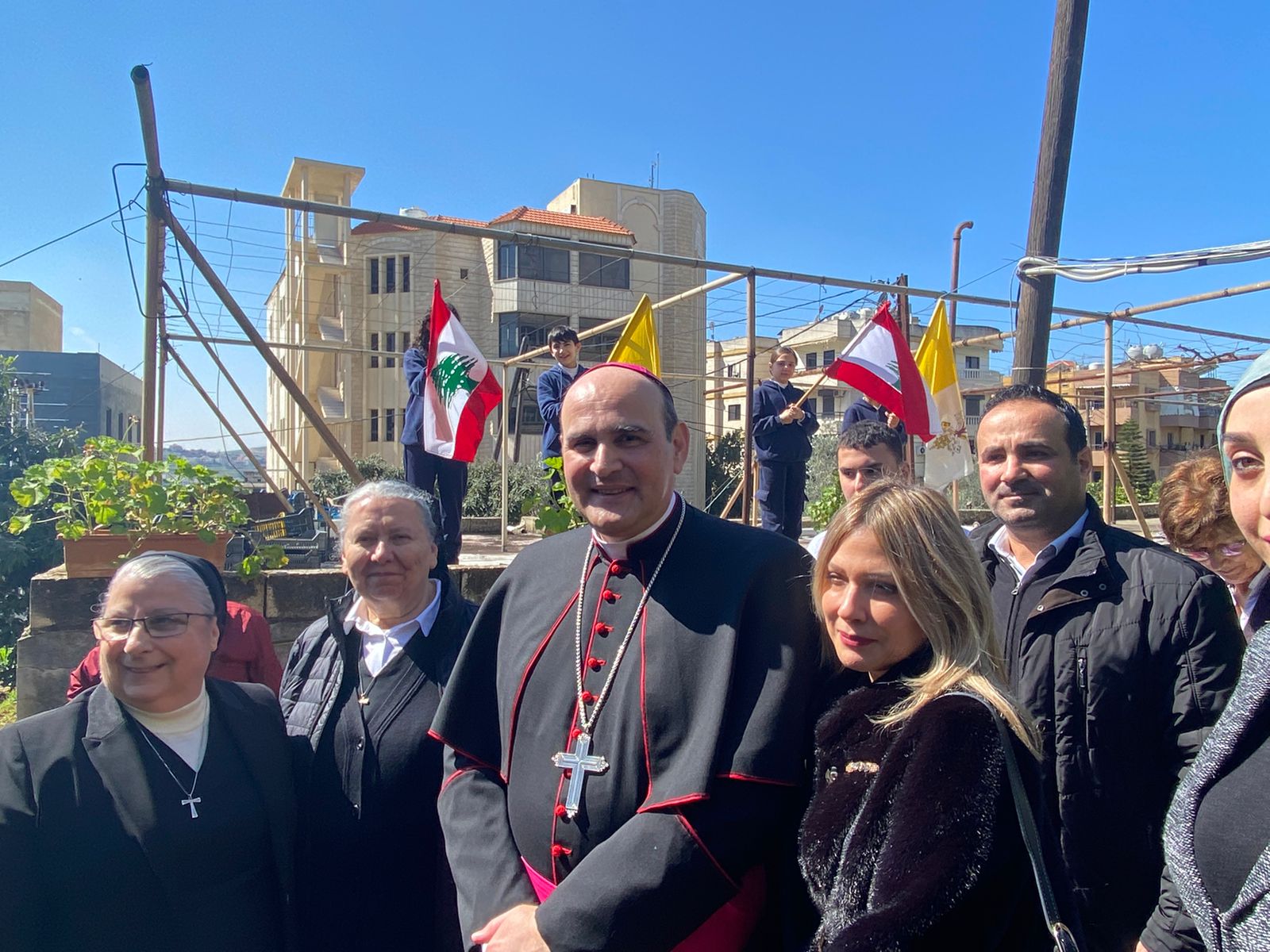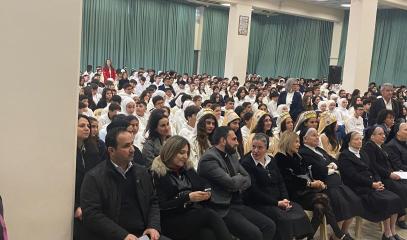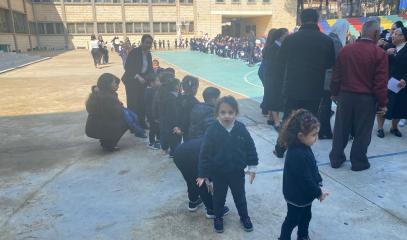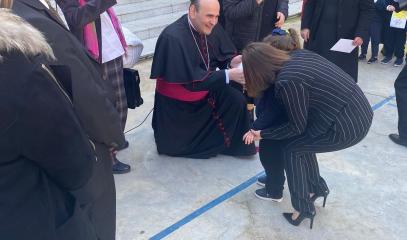Nuncio visits nuns-run school in Nabatiyeh, seed 'of peace and dialogue' in southern Lebanon
Responding to an invitation from the women's branch of the Lebanese Order of the Antonines, Archbishop Paolo Borgia visited the school, located in an area dominated by Amal and scene of the fiercest clashes between the Israeli army and Hezbollah. The prelate conveyed Pope Francis’s closeness and prayers for peace.
Nabatiyeh (AsiaNews) – The Apostolic Nuncio to Lebanon, Archbishop Paolo Borgia, visited the school run by the Antonine Sisters in Lebanon. The whole college is involved amid a general climate of uncertainty. Nabatiyeh, a stronghold of the Shia Amal movement, has just been plunged into mourning by an Israeli strike that decimated a family of seven, "collateral damage” of an attack that likely failed its objective.
The ambassador of the Holy See does not seem worried. He braved the anxieties of those around him about the state of security to honour a pledge he made to the Superior General of the women's branch of the Antonine Order, Sister Nazha Khoury, to visit the school that the nuns have run for 70 years. They are also hosting Sr Gérard Merhej, the director of the school in the Maronite border village of Debel, which has been forced to close due to the war.
Nabatiyeh College is an imposing building typical of the 1950s, with a rectilinear structure, carved stone walls, high ceilings. It is home to a large school community of 1,200 pupils and young people, including a small number of Christians (58 in all), and an army of female teachers, veiled or not, supervised by five nuns.
As if to illustrate the widespread apprehensions of visitors and their guests, distant echoes of explosions occasionally reach the establishment, as well as the news of the bombing of a target in Baalbeck. But that does not mean that the visit was disrupted. Parents, fearing the unexpected, come to pick up their children in a hurry. The nuns are used to it.
The nuncio is entitled to a great moment, a joyful and exuberant welcome, as if from another time with greetings, speeches, coffee, chats with teachers, a word from the parents' association, groups of children applauding him or waving flags in the colours of the Vatican, a saxophonist playing the Avec Maria, songs, folk dances, photos, the release of a pigeon, the planting of an olive tree, a long tour of the wings of the building.
This is what happens in Nabatiyeh today, in a society eager for learning and values, but also for openness, social and cultural advancement, trusting the Antonin nuns to bring about the above.
"This is the true mark of Lebanon; it is unity in diversity," said Antoine Ghazal, a young Maronite priest who teaches philosophy to the final grades as well as, every Monday, a weekly Christian-inspired reflection that people, it is said, wait for from week to week.
Family-school complementarity
In an impromptu speech addressed to the parents' committee, the nuncio insisted on the importance of complementarity between the family and the school to teach children about openness. In this school, founded in 1953 – originally for girls, now co-educational – where Ali and Maroun, Graziella and Zeinab sit on the same benches, many of the teachers and members of the parents' committees are themselves former students.
"The fact that parents are always at the side of the nuns is something very beautiful," said Archbishop Paolo Borgia, who insisted that "the school is at the centre of the cultural, but above all, human education" of a society.
In the large village hall, in front of the entire school, principal Sister Marie Touma thanked the nuncio for coming "to a region at risk" and assured him that his visit “will encourage the mission of the nuns to preserve peaceful interreligious and multicultural coexistence.”
To these words, the ambassador of the "man in white" replied: "What is the future that everyone wants for Lebanon? It is peace. No good is greater than peace. Without peace, there is no respect for others, no justice, no solidarity. It would otherwise be the reign of everyone for themselves, and sometimes one against the other.
“Peace is encounter, dialogue, well-being. Peace is life, the very condition of life. Hatred only brings death. But if peace is a gift from God, it is also patiently built day after day by people, just like the olive tree that I am going to plant in the school orchard, which will need daily and seasonal care to grow and bear fruit. I invite you to keep alive in your hearts the flame of hope for peace.”
Justifying his visit in a period of instability, the nuncio explained to students from the higher grades who questioned him on this subject that "a visit often responds to the need to encourage someone, to comfort them.”
Still, current affairs are not far from the surface. Passing between two rows of flag-waving schoolchildren, one student was overheard telling a classmate who had doubts about the visit: "At least, he is not a Zionist.”
"I went home happy to have seen so many well-educated young people. It was a beautiful day. I am proud of the Sisters," the nuncio said privately, at the end of a visit that may seem unimportant in relation to the ongoing conflict, but which will certainly remain an unforgettable moment in the history of the school. Among the things to remember are the gifts to the institution and to a teaching staff made vulnerable by economic crisis and war.










.png)










